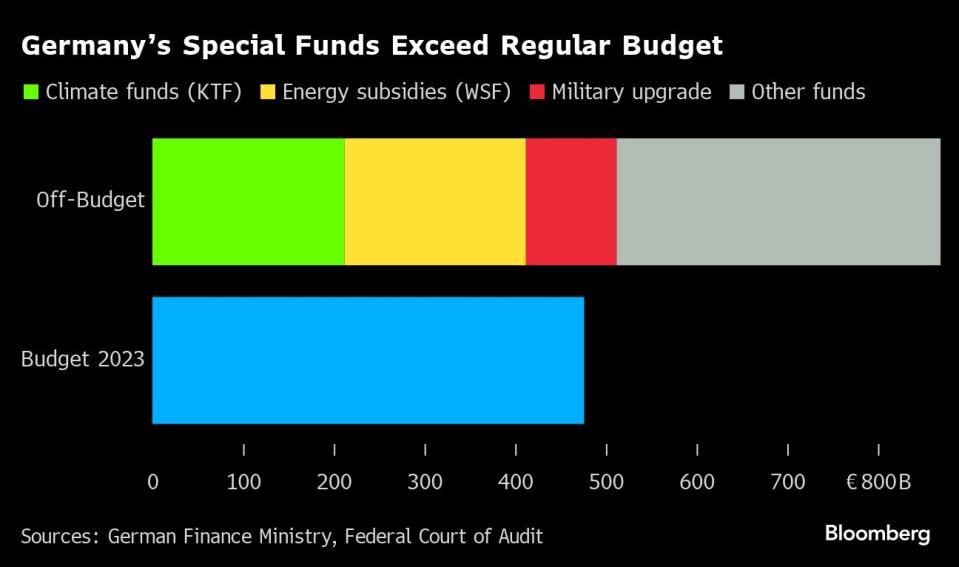German Economy Chief Warns of Major Blow From Budget Ruling
- Oops!Something went wrong.Please try again later.
- Oops!Something went wrong.Please try again later.
- Oops!Something went wrong.Please try again later.
(Bloomberg) -- German Vice Chancellor Robert Habeck said last week’s ruling by the country’s top court curbing the use of off-budget special funds is a major blow for Europe’s biggest economy and could lead to higher energy costs for households and companies.
Most Read from Bloomberg
Citigroup Cuts Over 300 Senior Manager Roles in Latest Restructuring
Nearly All of OpenAI Staff Threaten to Go to Microsoft If Board Doesn’t Quit
The Doomed Mission Behind Sam Altman’s Shock Ouster From OpenAI
Constitutional Court judges said that €60 billion ($65.5 billion) in untapped credit authorizations can’t be transfered into the government’s Climate and Transformation Fund, potentially threatening projects like the expansion of hydrogen infrastructure and charging stations for electric vehicles.
While the government is still digesting the ruling and how to implement it, it’s already clear that it will have “massive implications” for Germany’s transformation to a cleaner and more technologically advanced economy, Habeck said Monday in an interview with Deutschlandfunk radio. It also potentially impacts similar off-budget vehicles, he added.
Read More: German Ruling Puts €770 Billion of Government Funds at Risk
“This is about the core substance of the German economy,” Habeck said. “The answer is not easy to find and things could get really difficult.” Government support for efforts by companies to green manufacturing processes, including in the steel industry, and the expansion of solar power are among initiatives under threat, he said.
As well as throwing the governing coalition’s budget policy into disarray, the bombshell ruling has prompted renewed debate about rules enshrined in Germany’s constitution that limit net new borrowing, known as the debt brake.
Lawmakers from Chancellor Olaf Scholz’s Social Democrats and Habeck’s Greens have called for the rules to be temporarily set aside again, as they were to help the government deal with the fallout from the Covid-19 pandemic and the energy crisis. The fiscally hawkish Free Democrats, led by Finance Minister Christian Lindner, have categorically ruled out such a move.
Habeck, who is also the economy minister, said that while he believes that the rules are “inflexible,” he is also aware that the constraints of the coalition with the FDP limit any room for maneuver. Asked if suspending the debt brake again is the right move, he said it’s too early to say and declined to “speculate.”
“I can only refer to the economic data and note that the year 2023 had three quarters of virtually no growth,” Habeck said. “How we will implement this ruling has not yet been decided.”
Read More: Bundesbank Says Germany Must Respect Constitutional Debt Brake
Scholz’s chief spokesman, Steffen Hebestreit, said Monday that the government’s analysis of the “complex legal ruling” is ongoing and it would “certainly take some more days.”
Habeck also raised the prospect that the court ruling will impact Germany’s Economic Stabilization Fund, known as the WSF.
If that proves to be the case, it could have implications for around €30 billion euros of net new debt that has been allocated to help shield companies from high energy prices. That borrowing may have to be retroactively accounted for in the 2023 budget, leading to a breach of the debt-brake rules that Lindner insisted on reinstating.
If the government is forced to take action on the WSF funds, it would mean that households and firms would face higher power prices and, potentially, higher gas costs as well, Habeck said.
He lashed out at the opposition conservatives, who filed the challenge to the KTF fund with the Constitutional Court, and said one outcome is that the government can no longer afford to shield consumers from expensive energy.
“They filed the legal challenge, it must be said, in favor of people in Germany paying higher prices,” he told Deutschlandfunk.
Saskia Esken, a co-leader of Scholz’s Social Democrats, told Funke media group at the weekend that the government will likely have to suspend the debt brake in both 2023 and 2024 as a consequence of the court ruling.
She also called for a more general loosening of the fiscal rules. The coalition would need the support of the conservatives for such a move, as a two-thirds majority in parliament is required.
--With assistance from Michael Nienaber, Kamil Kowalcze and Arne Delfs.
(Updates with Scholz spokesman in ninth paragraph)
Most Read from Bloomberg Businessweek
More Americans on Ozempic Means Smaller Plates at Thanksgiving
The Share of Americans Who Are Mortgage-Free Is at an All-Time High
At REI, a Progressive Company Warns That Unionization Is Bad for Vibes
Inflation Raging in Triple Digits Is Pushing Argentina Down a Radical Path
The Impact and Cost of Musk’s Endorsement of Antisemitism on X
©2023 Bloomberg L.P.



